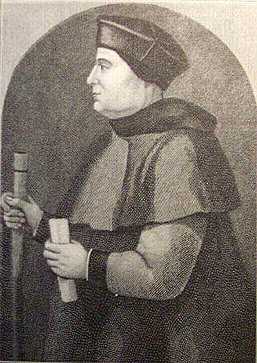Cardinal Wolsey
A man of "unbounded stomach*," Thomas Wolsey was a brilliant and ambitious butcher's son who rose to a position of almost unlimited power during the first twenty years of Henry VIII's reign.
Wolsey was an eloquent and skilled administrator, and he increased England's prestige in Europe. But by the end of his career he was also the most envied and hated man in England, resented for his monopoly of royal favour, his ties to the Pope, his greed and flamboyance, and his blatantly corrupt ways.
Butcher to Chancellor
Wolsey's unprecedented rise from butcher's shop to King's Council could only have been achieved through a career in the Church, for which university was a necessary preparation. Wolsey began his B.A. at the early age of 15; after graduating he entered the clergy, where he advanced to become royal chaplain and foreign diplomat for Henry VII. During these early years in the church he also began his profitable accumulation of benefices*.
Wolsey's flamboyant personality appealed to the newly crowned Henry VIII, who appointed him to the Council and gave him control over those tedious but crucial details of statecraft that his father had handled himself. Wolsey organized the successful French campaign of 1513, the later peace agreement with Louis XII (1516), and the opulent meeting between Henry and Francis I on the Field of Cloth of Gold (1520).
He was rewarded with more benefices, and was also appointed Lord Chancellor and keeper of the Privy Seal. Pressure on the Pope from Henry and Francis I gained Wolsey his Cardinal's hat and in 1518 he became legatus a latere*, giving him supreme authority over the English Church.
But Wolsey's success made him a target for satire*, and fortune's wheel eventually turned; his was a classic example of downfall and death.
Footnotes
-
Wolsey's appetites
"Stomach" does not mean that Wolsey loved food (which he did), but that he had an appetite for power.
He was a man
Of unbounded stomach, ever ranking
Himself with princes; one that by suggestion
Tied all the kingdom. Simony was fair play;
His own opinion was his law. I'th'presence [i.e. of the King]
He would say untruths and be ever double
Both in his words and meaning. He was never,
But where he meant to ruin, pitiful.
His promises were, as he then was, mighty,
But his performance, as he is now, nothing.
(Henry VIII 4.2.33-37)Under the pretext of reforming the Church Wolsey extorted money for himself and the King while at the same time being notorious for his own clerical abuses: chiefly his holding of more benefices than he could administer (pluralism); the selling of offices and preferment (simony); and ignoring the rule of celibacy (he had two illegitimate children by an innkeeper's daughter, in due course providing his teenage son with rich benefices of his own). His support of heavy taxation and forced loans during wartime increased resentment, especially in view of his own excessive wealth. He went everywhere in grand style, held extravagant masques and revels, and built several palaces for himself (above all the magnificent Hampton Court, later given to the King as a gift--at a tactically appropriate moment).
-
Benefices
A benefice was a "living," a parish that the possessor of the benefice could staff with clerics, taking a proportion of the tithes due to the church. The whole system is discussed in the section on the religious background.
-
The legate a latere
Since early after the Norman Conquest the Archbishops of Canterbury played the role of papal legate in England, giving them primacy over other Church benefices. The legate a latere was a rare and specially appointed representative of the Pope, having powers superior even to the Archbishop of Canterbury.
-
A satirist at Court
The brilliant and eccentric poet, John Skelton, made Wolsey the target of his long poem "Why Come Ye Not to Court." Skelton was an early Humanist; his poems, often learned, are full of ingenious tumbling rhymes.
He also wrote a highly original version of the Morality play, changing the abstract characters in the play from figures of general human morality to characters acting out political vices and virtues.
